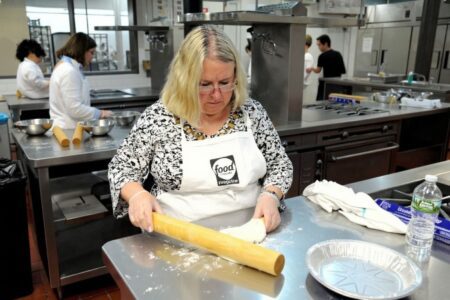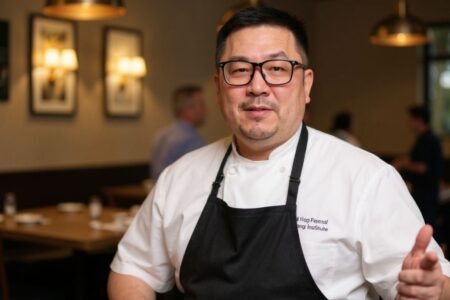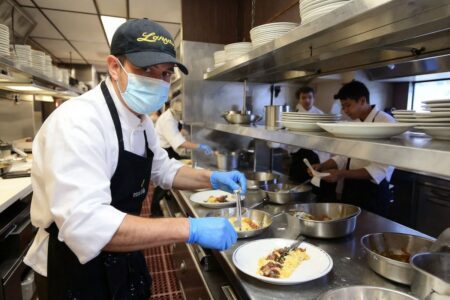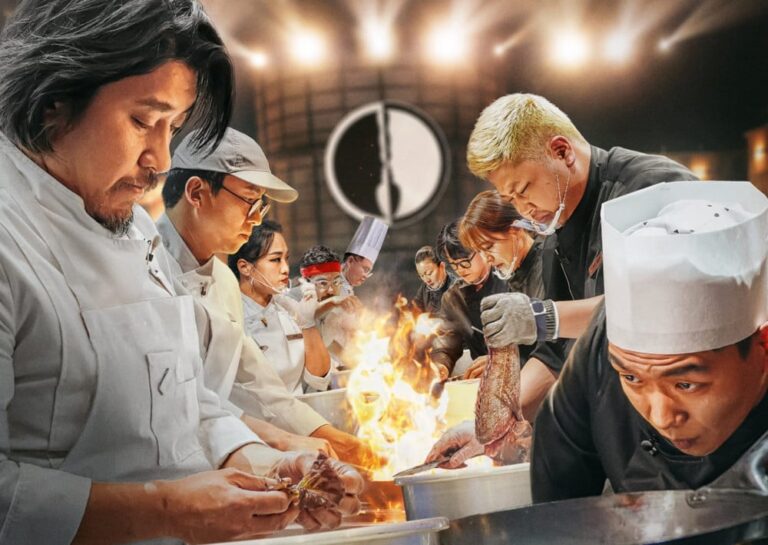
The knives are out on Netflix’s newest reality TV hit, Culinary Class Wars.
If you haven’t been binge-watching it, it’s just like MasterChef and Iron Chef — except on steroids.
It’s way more high stakes and with a lot more contestants — as many as 100 chefs, with 20 elite Michelin-starred, ex-MasterChef, ex-Iron Chef going head-to-head against 80 underdog chefs.
Led by chef and food researcher Paik Jong-won and three-Michelin-starred chef Ahn Sung Jae, each episode is a thrilling battle of skill and creativity — making it to Netflix’s top 10 most-watched list across 28 countries.
Impressively, it has held the top spot on Netflix’s Global TOP 10 TV (Non-English) chart for two weeks in a row.
We want to be just as passionate in creating magic through food, just like the contestants — the question is: how do you even become a chef?
 Throughout Gordon Ramsay’s career, he has earned a total of 17 Michelin stars.
Throughout Gordon Ramsay’s career, he has earned a total of 17 Michelin stars.
How to become a chef: Culinary school vs apprenticeships
You have two options: attending a culinary school or pursuing an apprenticeship.
Both paths offer unique advantages, and your choice largely depends on your learning style, career goals, and financial situation.
Culinary school gives you an all-around education in cooking, from basic knife skills to advanced techniques. It’s more structured, but it can be expensive and doesn’t always provide much time in a real kitchen.
On the other hand, apprenticeships allow you to dive right into the action, learning on the job and getting paid (though not a substantial amount) as you progress. But without the basics, the fast pace might leave you behind.
Whether you choose culinary school or an apprenticeship, both paths can lead to success. After all, some of the world’s most popular Michelin-star chefs didn’t attend culinary school.
Eight-Michelin-star chef Gordon Ramsay earned a degree in hotel management at North Oxfordshire Technical College.
Thomas Keller, the first American chef to earn two three-star Michelin ratings, learned by working under esteemed chefs in the US and achieved success.
While these chefs prove that formal schooling isn’t a must for culinary success, many employers still value the skills and discipline that come with a structured education — or, in the case of Chef Ahn, a stint in the US Army.
Ahn Sung-jae was a soldier before becoming a chef
Ahn Sung Jae’s family moved to America when he was 13 years of age, where he used to help out at his parents’ Chinese fast-food restaurant. Although he didn’t initially enjoy his time there, that experience became the seed of his strong work ethic.
Ahn served in the US Army, spending a year in Iraq to save money to fund mechanic school.
But two weeks before school was due to start, he saw a bunch of people in white uniforms walking down the street while he was driving — they were students of the Le Cordon Bleu College of Culinary Arts, Los Angeles.
That day itself, he went in to speak to a counsellor. Believe it or not, the rest was history.
Ahn would go on to graduate from Le Cordon Bleu.
He worked at top restaurants, including Urasawa, The French Laundry, Benu, Aziza, and others.
In 2016, Ahn opened Mosu in San Francisco, earning a Michelin star within a year of its opening. In 2017, he relocated to Seoul, bringing Mosu with him, blending Korean, Japanese, and French influences.
Ahn Sung Jae is an example of a pioneering chef who did it the traditional way. He attended culinary school, worked his way up through the ranks in various restaurants, and, with sufficient experience working in other chefs’ kitchens, finally opened his own.
But did the other chefs on Culinary Class Wars take the same journey?
SEASON 1: The education of 8 Culinary Class Wars chefs you probably didn’t know
Kang Seung Joon (Winner)
Kang Seung Joon, a.k.a Napoli Matfia (Black Spoon contestant), bagged the grand prize of 300 million won — and for good reason, he’s a hella good chef.
However, becoming a chef wasn’t exactly what he wanted to be growing up. He wanted to become a nurse, but due to low CSAT scores, Kang had to think of a different career path. Coincidentally, he stumbled upon Gordon Ramsay’s video on YouTube. Impressed, he decided to go down the same path.
Kang pursued a major in Hotel Culinary Arts at Shinhan University, with a focus on Italian cuisine.
He then studied abroad in Italy at Alma International Culinary Institute (ALMA), where he gained fluency in the Italian language and even spent his early career working for Michelin-starred restaurants across the country.
This includes three-Michelin-starred Le Calandra and two-Michelin-starred restaurant Dan Maison.
Today, Kang runs his own restaurant, Via Toledo, in Yongsan, Seoul, where he serves his signature pasta dishes.
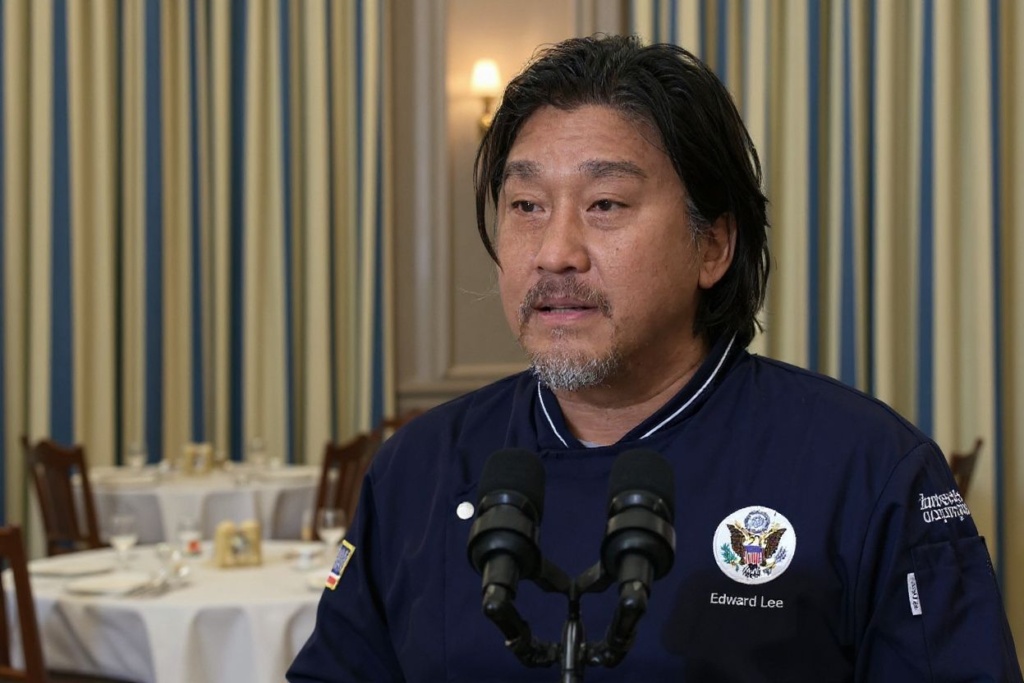
Edward Lee had the honour of preparing the meal for the 2023 White House State Dinner, welcoming the President and First Lady of South Korea in 2023.
Edward Lee (Runner Up)
Chef Edward Lee’s journey is a testament to following one’s passions. Growing up in Brooklyn as a Korean-American, his heart was split between two worlds: food and literature.
Initially envisioning a life as a writer, he graduated magna cum laude from New York University with a degree in literature. However, the vibrant energy of restaurants called to him.
Today, he proudly leads the kitchen at 610 Magnolia in Louisville, Kentucky, where his culinary talents have earned him recognition as a four-time nominee for the James Beard Foundation’s Best Chef award.
Beyond the kitchen, he co-founded LEE (Let’s Empower Employment) and established 19 relief kitchens across the US to support farms severely impacted by the COVID-19 pandemic.
View this post on Instagram
Jung Ji Sun
While attending a commercial high school, “Queen of Dim Sum” chef Jung Ji Sun earned a computer-related certificate but quickly realised it wasn’t her true calling.
She took a part-time job as a dishwasher, and with her hard-earned savings, she enrolled in the Hotel Culinary Arts Department at Hyejeon University.
Upon graduating, she set off for China with hopes of studying at Yangzhou University. Despite arriving without a language certificate and limited knowledge of the Chinese language, she immersed herself in Chinese studies, ultimately securing admission after months of effort.
Now, she’s the head chef at Tian Mi Mi, and after appearing on Culinary Class Wars, her restaurant’s sales have skyrocketed — almost tripling.
Kang Seung Won
Meet Chef Kang Seung Won, one of the top three finalists on Culinary Class Wars. His passion for cooking sparked in elementary school, leading him to Le Cordon Bleu and a series of stints in Michelin-starred kitchens.
He was the sous-chef at Mosu, working alongside Culinary Class Wars judge Ahn Sung Jae, and also worked at Benu, a three-star gem in San Francisco.
Currently, he owns Trid, a contemporary fine-dining restaurant that has earned recognition in the Michelin Guide Seoul for three consecutive years.
View this post on Instagram
Choi Kang Rok
Choi Kang-rok became a fan favourite on Culinary Class Wars, delivering memorable moments and humorous lines like, “This set is all fiction. Let’s not be NPCs,” and “I’m all about perilla oil.”
Before his culinary career, Choi briefly studied Spanish but enlisted in the Marine Corps during the IMF crisis. After serving, he worked part-time at a pork cutlet restaurant and a Japanese eatery to fund his passion for music.
His career took a turn when, inspired by the cartoon Mr Sushi King, he pursued cooking and opened his first sushi restaurant at the age of 24. However, he struggled due to inexperience.
At nearly 30, he moved to Japan, where he quickly learned Japanese at a temple and attended Tsuji Culinary Institute.
After graduating, he returned to Korea as a faculty member at a Japanese Cuisine Academy. His entrepreneurial spirit led him to open a Japanese side dish restaurant in Jamsil, but he closed it after incurring significant losses.
To pay off debts, Choi worked at a tuna trading company and, while drunk one night, applied for MasterChef Korea 2, ultimately winning the competition. Then, in April 2022, he opened Neo, an Omakase Japanese restaurant in Samjeon-dong, which continues to thrive today.
Choi Ji-hyung
Choi Ji-hyung did more than turn the Korean street food staple sundae, or blood sausage — pig intestine — into a luxurious art that’s now featured in the Michelin Guide for Seoul. He’s the owner of the restaurant Lee Buk Bang, bringing North Korean cuisine to the fine dining scene in South Korea.
The 37-year-old chef takes his heritage into his food. His grandmother was a refugee from Hamgyong Province in North Korea, and these were the kinds of foods he grew up eating.
“I wanted to make a place where people can get the energy to heal the daily stress of today from my simple but warm dishes like grandmother’s home-made meals,” he told the South China Morning Post.
Choi earned his bachelor’s and master’s degrees in culinary arts at Johnson & Wales University in Rhode Island, and has experience working in a variety of two- to three-star Michelin restaurants.
Oh Se-deuk
A certified celebrity Chef, Oh Se-deuk’s face and humorous personality may be familiar to you if you’ve watched the South Korean programme, “Please Take Care of My Refrigerator.”
But he’s snagged the celebrity title not just because of his character on Korean television.
Oh runs two restaurants in the serenity of Jeju Island — Chinmeal, of French cuisine, and Oh Pan Fire, an American restaurant. He’s the definition of someone who’s unafraid to explore, using traditional Korean ingredients to spice up French recipes.
He told the Korea JoongAng Daily back in 2012 that his culinary dreams were realised thanks to a high school girlfriend. “I wanted to impress her, so I told her that I would become a world-famous chef one day and that I would cook her the best dishes from around the world,” he said.
Oh Se-deuk graduated from the Institute of Culinary Education in New York in 2002.
View this post on Instagram
Park Joon-woo
The cuisinier-pâtissier-traiteur — meaning “cook, pastry chef, and caterer” in French — would find an impetus to start cooking through the art of words. Born in South Korea, Park Joon-Woo and his family moved to Belgium when he was 18.
His dreams would take a couple of different shapes before he found the art of patisserie.
He dropped out of a modern languages programme at a university and quit working as a sculptor before taking on a five-month cooking course.
However, it wasn’t until he started writing about the culture of Belgian food on a blog that he developed a passion for food.
When Park returned to South Korea, he took part and became a runner-up in season one of MasterChef Korea.
But his real calling is in delectable sweets. Park currently owns Aux Petits Verres, an artsy retreat and European-style cafe in Seoul, overflowing with desserts and Belgian beer.
View this post on Instagram
SEASON 2: The education of 9 Culinary Class Wars chefs you probably didn’t know
Lee Jun
Participating as one of the 20 ‘White Spoon’ chefs on Culinary Class Wars Season 2, Lee Jun has made his mark in the culinary industry.
He studied culinary arts at Kyung Hee University in South Korea and later at the Culinary Institute of America (CIA) in the US. While at CIA, Kang worked in some of the world’s best restaurants, including Thomas Keller’s three-Michelin-starred restaurant, Per Se.
Today, Lee Jun is the founder and executive chef of the two-Michelin-starred restaurant Soigné. There, he and his team serve up a mixture of American, European, and Korean cuisine.
View this post on Instagram
Jennie Walldén
Born in Gwangju City, but raised in Sweden, Jennie Walldén is a part of the 20 ‘White Spoon’ on Season 2: Culinary Class War.
Walldén’s food journey started when she was on an exchange programme in Italy during her high school years.
When it came to pursuing her undergraduate degree, she chose to pursue a BA in Sociology at Lund University. She then moved abroad to London, UK, to complete an MSc in International Marketing at London South Bank University.
Walldén went on to work as a marketing manager at Orkla Sverige, Sweden’s largest food and beverage company, and also got married and had two children.
One day, her husband recommended her to participate in Sveriges Mästerkock, the Swedish version of MasterChef, in 2013. It was then that she beat out 2,000 competitors and began her career as a chef.
Today, she runs a Korean restaurant in Malmö and has written cookbooks, including ‘Wok, Ris, Nudlar’ and ‘Nudlar’.
View this post on Instagram
Shim Sung-chul
Shim Sung-chul’s love for food and cooking first started sizzling (no pun intended) during his high school years. He joined Ansan College of Technology to kickstart his culinary journey. He spent some time working for catering services, restaurants, and hotels in Seoul.
Shim loved it so much that he moved to New York City to undertake a premier externship at the three-Michelin-starred restaurant, Le Bernardin.
He also spent some time working for Manhattan’s most sophisticated fine dining restaurants, Aureole and Peacock Alley.
That’s not all; he had positions at Gordon Ramsay, Momoya, and Per Se. Shim even has an Associate of Occupational Studies Degree in Culinary Arts from the Culinary Institute of America.
Today, he is the owner-chef of Kochi and Mari, both of which have been awarded one Michelin star each — hence earning his spot as a ‘White Spoon’. Shim also recently founded Gui Steakhouse, a modern American steakhouse with Korean influences.
Disclaimer: This article was last updated on December 29, 2025.








